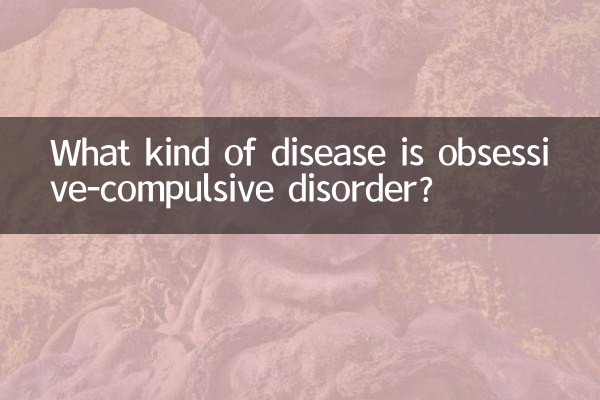What kind of disease is obsessive-compulsive disorder?
Obsessive-Compulsive Disorder (OCD) is a common mental illness characterized by recurring uncontrollable obsessive thoughts and compulsive behaviors. In recent years, with the popularity of mental health topics, obsessive-compulsive disorder has gradually become a hot topic of social concern. This article will combine hot topics and structured data in the past 10 days on the Internet to deeply explore the definition, symptoms, causes and treatment of obsessive-compulsive disorder.
1. Definition and symptoms of obsessive-compulsive disorder

Obsessive-compulsive disorder is a mental disorder with obsessive thoughts and compulsive behaviors as its core symptoms. Sufferers often experience recurring, uncontrollable thoughts (obsessions) and engage in repetitive behaviors (compulsions) to relieve anxiety. The following are common symptoms of OCD:
| Symptom type | Specific performance |
|---|---|
| obsessive thinking | Recurrent unnecessary thoughts, such as fear of contamination, obsession with symmetry, etc. |
| compulsive behavior | Repetitive behaviors, such as washing hands repeatedly, checking doors and windows, counting, etc. |
| anxiety and pain | Feeling extremely anxious about being unable to control obsessive thoughts or behaviors |
2. Causes of obsessive-compulsive disorder
The causes of obsessive-compulsive disorder are complex and often result from a combination of genetic, environmental, psychological and neurobiological factors. The following are the main findings of recent research:
| Cause type | Specific instructions |
|---|---|
| genetic factors | People with a family history of obsessive-compulsive disorder are at higher risk |
| neurobiological factors | Imbalances in neurotransmitters such as serotonin in the brain may cause symptoms |
| psychological factors | Childhood trauma or chronic stress may trigger OCD |
| environmental factors | External factors such as life events or infections may trigger symptoms |
3. Treatment methods for obsessive-compulsive disorder
Treatment for OCD usually involves a combination of medication and psychotherapy. The following are common treatments:
| Treatment | Specific content |
|---|---|
| drug treatment | Selective serotonin reuptake inhibitors (SSRIs) are commonly used medications |
| psychotherapy | Cognitive behavioral therapy (CBT), especially exposure and response prevention (ERP), is highly effective |
| lifestyle adjustments | Regular work and rest, exercise, meditation, etc. can help relieve symptoms |
4. Hot topics about obsessive-compulsive disorder in the past 10 days on the Internet
According to data monitoring across the entire network, the following are hot topics related to obsessive-compulsive disorder in the past 10 days:
| hot topics | Discussion hot spots |
|---|---|
| Celebrities open up about obsessive-compulsive disorder | Many celebrities shared their own experiences and attracted public attention |
| The relationship between obsessive-compulsive disorder and perfectionism | Discussions on social media about the differences between the two have increased |
| Research progress of new treatment methods | Reports on new treatments such as transcranial magnetic stimulation (TMS) |
| The impact of the epidemic on patients with obsessive-compulsive disorder | Exacerbation of obsessive-compulsive symptoms caused by cleaning and disinfecting behaviors |
5. How to help patients with obsessive-compulsive disorder
When dealing with obsessive-compulsive disorder, the support of family and friends is crucial. Here are some suggestions to help patients:
| suggestion | Specific practices |
|---|---|
| understanding and acceptance | Avoid criticism or blame and understand the patient’s pain |
| Encourage medical treatment | Help patients seek help from professional doctors |
| Participate in treatment | Accompany patients to treatment sessions and provide emotional support |
| stay patient | The treatment of obsessive-compulsive disorder is a long-term process and requires patient companionship |
Obsessive-compulsive disorder is a treatable disorder, but it requires a collaborative effort among patients, families, and doctors. Through scientific treatment and social understanding, patients with obsessive-compulsive disorder can gradually return to normal life. If you or someone close to you may be suffering from OCD, please seek professional help promptly.

check the details

check the details